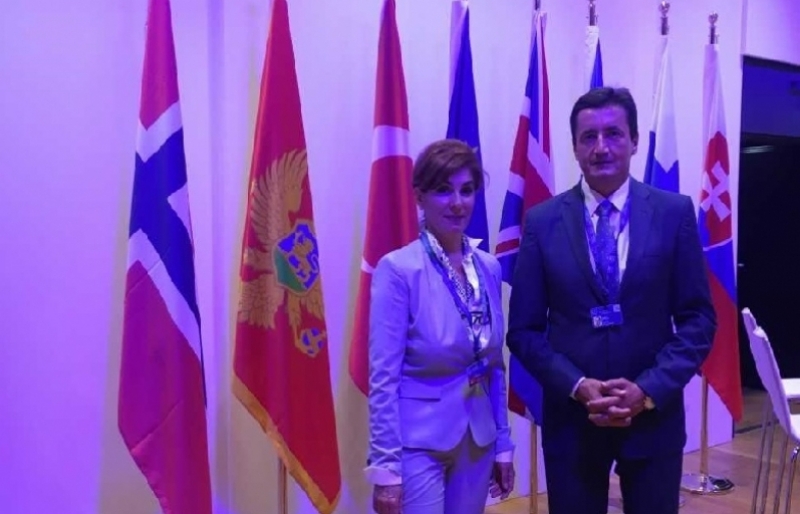Chairperson of the Committee on Economy, Finance and Budget Mr Predrag Sekulić and member of the Committee Ms Ana Nikolić participated in the Interparliamentary Conference on Stability, Economic Coordination and Governance in the European Union (SECG), which will be held in Vienna, Austria, on 17 and 18 September 2018.
The conference, organised within the parliamentary dimension of the Austrian presidency of the Council of the European Union, was opened by the President of the Austrian National Council Mr Wolfgang Sobotka and the President of the Federal Council Ms Inge Posch-Gruska, while it was chaired by Mr Karlheinz Kopf, Chairperson of the Finance Committee of the Austrian National Council. In their opening speeches, they emphasised that the EU countries must use their own potentials to ensure competitiveness, and that innovation and investment in education were key pillars enabling European competitiveness. Furthermore, the need to strike a balance between economic and social aspects was emphasised. Following the introductory remarks, the participants had discussions in four sessions.
During the first session, which related to the implementation of the EU fiscal policy framework, panellists pointed out that Europe must be deepened and simplified, and that its current, favourable economic conditions should be used for fostering sustainable budget policy in Europe. They said the financial crisis had shown that there were no adequate instruments to stabilise macroeconomics, and that stronger, simpler and more flexible fiscal rules were needed to ensure compliance of all EU member states.
Panellists called on parliamentarians for a stronger political discussion on the Fiscal Agreement, on increasing transparency regarding the role of national parliaments, as well as on expanding government oversight powers. They pointed out the significance of the European Semester, convinced that it should be further expanded to include national parliaments.
The second session was focused on investment, innovation, and education as drivers in a competitive Europe. It was pointed out that the motto of the Austrian presidency “A Europe that protects” cannot be understood only in the context of security and the fight against illegal migration, but also in ensuring prosperity and competitiveness. Panellists pointed out that Europe was still the leading trade power and the world’s largest single market, but that its impact was declining, therefore, in order to remain competitive on the international scene and create the best conditions for the success of future generations, it was necessary to advance in innovation and digitalisation.
The discussion focused on the question of how EU member states could move from their different starting points towards a common investment and research policy. Participants pointed out that it was particularly important that smaller and economically weaker member states should have a balanced and equal approach to financing, as well as investing in training and lifelong learning.
In the third session, which focused on anti-tax evasion mechanisms, panellists pointed out the need for a fairer tax policy, which was a task that no country could accomplish independently. They also pointed out the need for activities on taxing the digital economy and the introduction of a common corporate income tax model. It was reported that Austria alone loses about 1 billion euros a year due to tax fraud and evasion, and parliamentarians were invited to contribute to helping EU proposals advance. Among other things, it was pointed out that a joint consolidated corporate tax base was an important component in the fight against unfair tax competition.
During the fourth session, which focused on digitalisation and its repercussions on employment, panellists emphasised that policy making in this area must focus on alleviating fears and using opportunities. They emphasised the necessity and significance of innovation and digitalisation by supporting the application of the subsidiarity principle. They pointed out a new European industrial policy that includes environmental and consumer protection, while being in line with global markets. Furthermore, it was emphasised that the process of acquiring digital competences must include everyone, and consequently, the promotion of digital skills was necessary.
At the end of the meeting, it was assessed that joint efforts were needed to help Europe face the challenges of economic and fiscal policy. Parliamentarians, among other things, called for the completion of the Banking Union, the creation of the European Monetary Fund, the ensuring of the rights of national parliaments in the light of the reform of the European Stability Mechanism, and they also warned that social dimension should not be excluded from the discussion on the fiscal policy stability.
There was a general overview of the fact that Europe needed a new industrial policy, with increased investment in education and innovation, and that the EU must be united and focused on its own strengths if it wanted to keep pace with the United States and Asia in the international competition. Parliamentarians pointed out the urgent need for digital taxation solutions and the harmonisation of corporate income tax. Important issues for parliamentarians included the fight against tax havens, and speeding up the pace of tax on financial transactions.
The chair of the conference called on members of national parliaments to exchange ideas that were highlighted during a conference with MPs in their own parliaments, as parliamentarians bring European policies closer to their citizens and thus contribute to the common entity.












